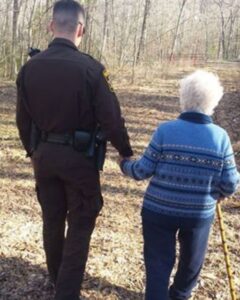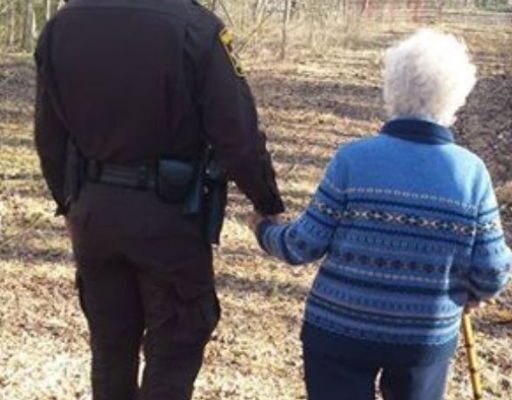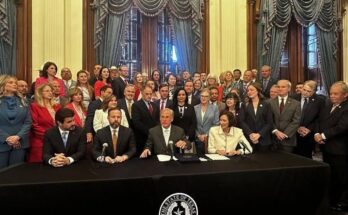It was supposed to be a quiet afternoon.
My mom had been having more of those days lately—where names got slippery and the calendar meant nothing. Some days, she thought I was her sister. Other times, she’d ask where her husband was… even though he passed away nine years ago.

I’ve learned not to correct her too much. Just go with the rhythm of her world and make her feel safe.
So when the officer knocked on the door and said he was doing “a friendly welfare check,” I assumed someone had reported a light left on or a front door open too long. I thanked him, said everything was fine, but he glanced past me and saw my mom peeking from the kitchen window.
He smiled.
Then, he stepped forward and said, “I’d like to speak with your mother, if that’s alright.”
I was taken aback. The smile on his face was warm, but there was something about his demeanor that made me pause. I hadn’t seen this officer before, and the whole idea of a “welfare check” felt a little off. He wasn’t in uniform, just wearing plain clothes, with a soft badge on his belt.
“Sure,” I said cautiously, moving aside so he could enter.
My mom, who had been stirring a pot of soup that she’d probably forgotten about ten minutes ago, caught sight of him and smiled as if she recognized him. Her face lit up in that way she did when someone was familiar to her. It was moments like these that tugged at my heart—the flickers of the woman she once was before dementia began to erode her memory.
The officer approached her slowly. “Hi, Margaret,” he said in a voice that was low and soothing. “How are you today?”
Mom looked at him with that familiar, confused look she often wore before she started pretending to remember someone. “Oh, I’m fine, sweetheart,” she said, her voice cheery. “Are you here for tea?”
I glanced at the officer, confused, unsure why he was using her first name, why he seemed so comfortable. He gave me a brief, almost imperceptible nod, then turned back to my mom.
“Not for tea today,” he said, a chuckle in his voice. “But I’m glad you’re doing well.”
He sat down across from her at the kitchen table, his eyes never leaving hers. I noticed he took her hand gently in his. Something about the way he did it—softly, almost tenderly—made me uncomfortable, like it wasn’t a typical officer-citizen interaction.
I opened my mouth to ask what this was about, but then something else caught my eye. I saw the expression on my mom’s face shift slightly, a small frown replacing her usual content smile. For a second, I thought she might be realizing something wasn’t quite right. But then, like so many times before, the moment passed and her face softened again.
“Are you sure you’re alright?” the officer asked my mom, his voice almost a whisper.
“I’m fine, dear,” she answered, squeezing his hand back. “Just a little forgetful, you know. That’s all.”
The officer nodded, his eyes darkening for just a moment, then he stood up. “I’m sure,” he said, his tone slightly more serious now. “But I’ve been hearing some reports of people checking in on elderly folks around here… People like your daughter, Margaret, might be getting a little overwhelmed by everything.”
I glanced at him, puzzled. What was he implying? That I couldn’t take care of my mom?
“I’m perfectly fine, thank you,” I said sharply. “I take care of her every day.”
The officer raised his hands in a gesture of peace. “Of course. But sometimes people need help, and they don’t ask for it. Just wanted to make sure everyone’s doing okay here.”
He gave me a polite nod and started backing toward the door. But as he did, he glanced at my mom once more, then gave her a small, unsettling smile.
“You know,” he said slowly, “I’d love to come by again, maybe next week. Just to check on you both.”
I opened my mouth to protest, but before I could, he was already out the door, the sound of his footsteps fading as he walked away.
I stood there, frozen, for a moment, staring at the door. Something didn’t sit right with me about the whole interaction. I wanted to dismiss it—maybe he was just doing his job. But the way he had spoken to my mom, the way he touched her hand—it felt too familiar. Too personal.
Later that night, after my mom had gone to bed, I called a friend of mine who worked in local law enforcement. I briefly told her about the officer’s visit, and her tone immediately shifted when I mentioned the name he had used for my mom.
“That’s… strange,” she said, her voice low. “That name isn’t on any officer’s roster I know of. And if he’s making those kinds of ‘welfare checks,’ something isn’t adding up. I’d be careful.”
That was all it took for my instincts to kick into full gear. I knew I had to find out who this man really was.
The next morning, I visited the local police station. The officer who had visited us hadn’t checked in with dispatch, and no record existed of a “welfare check” scheduled for our address. I felt a chill run down my spine.
Then, I did something I should have done the day before—I started doing some digging. I googled his name, and what I found shocked me. The officer’s name was real, but there was something about his past that didn’t add up.
He wasn’t a policeman at all.
I traced his name through some public records, and to my horror, I found that he had been convicted years ago of a crime involving an elderly woman—a crime that had been covered up at the time. It wasn’t anything as direct as what I feared, but it was enough to make me shudder.
I returned home, heart pounding in my chest. I felt sick to my stomach. My mom had trusted him—smiled at him. And I had let him in without even questioning him. I was angry with myself for being so blind.
But now I had proof, and I needed to protect my mom.
I went straight to the local police, explained everything I had found, and filed a report. They took it seriously, thankfully. They assured me they would look into it and take appropriate action.
A few days later, I received a call from the station. They had found the man and arrested him—not for anything criminal yet, but for impersonating an officer. Apparently, he had been using his charm and fake credentials to gain access to elderly homes, particularly ones where family members weren’t around much.
As it turned out, my mom wasn’t the only one he had tried to “check in” on. There were a few others, but thankfully, none had been harmed.
In a strange twist of fate, my search for answers had turned into a kind of rescue mission. If I hadn’t trusted my instincts, if I hadn’t made that call to my friend, the officer might have gotten away with his scheme for much longer.
The karmic twist was this: by protecting my mom, by digging deeper, I had not only saved her from potential harm but also uncovered a pattern of predatory behavior that could have hurt many others. It felt like justice, in its own quiet way.
After it was all over, the local community sent over a kind gesture. A group of my mom’s old friends, some who had been around before she began to forget things, organized a little gathering at our house. It wasn’t anything extravagant—just tea and laughter, a simple reminder of the life she had lived before everything started slipping away.
The officer’s arrest wasn’t just about getting him off the streets—it was a reminder that sometimes, even in the smallest moments, we have to trust our instincts. Sometimes, protecting those we love means going the extra mile, even when everything seems fine on the surface.
So, the lesson I’ve learned through all of this is simple: never ignore your gut feeling. If something doesn’t feel right, ask questions, look for answers, and never stop protecting those you love. Because you never know when a small decision can change the course of everything.
If this story resonated with you, or if you’ve ever had an experience where your instincts helped you, please share this with someone who might need to hear it. And don’t forget to like the post—because together, we can remind each other to always stay vigilant and protect those who matter most.



